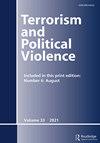《为什么我们变成了革命者和杀人犯》:Ustaša-Croatian革命组织中的激进化、恐怖主义和法西斯主义
IF 2.1
2区 社会学
Q1 INTERNATIONAL RELATIONS
引用次数: 0
摘要
本文提出了一种跨学科和多因素的社会文化方法来研究两次世界大战期间南斯拉夫Ustaša的法西斯化,导致恐怖主义和种族清洗。它集中在Mijo babiki和Zvonimir Pospišil的生活轨迹上,这两位民族主义活动家以第一批Ustaša恐怖分子而臭名昭著。根据Pospišil和babiki之前不为人知的政治回忆录,文章认为,这两位活动家在Ustaša组织中积累激进化的几个阶段之间建立了联系,从20世纪20年代在基层采取政治暴力到30年代的国际恐怖主义,然后是40年代上半叶国家支持的种族灭绝。文章指出Ustaša经历了McCauley和Moskalenko(2008)所指出的大多数形式的政治激进化到恐怖主义,但它也为其类型学增加了一个政权阶段激进化到大规模暴力的案例。因此,Ustaša的轨迹说明了一个罕见的过渡过程,从一个反对的、非国家团体的激进化,到法西斯极权主义政权下导致种族灭绝政策的大规模激进化。希望这篇文章提出的激进化的传记方法有助于更好地理解1918年后欧洲出于政治动机的恐怖主义和大规模暴力。本文章由计算机程序翻译,如有差异,请以英文原文为准。
“Why We Have Become Revolutionaries and Murderers”: Radicalization, Terrorism, and Fascism in the Ustaša–Croatian Revolutionary Organization
This article advances an interdisciplinary and multifactorial socio-cultural approach to the fascistization of the Ustaša in interwar Yugoslavia, leading to terrorism and racial cleansing. It concentrates on the life-trajectories of Mijo Babić and Zvonimir Pospišil, two nationalist activists notoriously known as the first Ustaša terrorists. Drawing on the previously unknown political memoirs of Pospišil and Babić, the article argues that the two activists bridged several phases of cumulative radicalization in the Ustaša organization, from the adoption of political violence at the grass-root level in the 1920s to international terrorism in the 1930s and then state-sponsored genocide in the first half of the 1940s. The article points out that Ustaša underwent most forms of political radicalization to terrorism identified by McCauley and Moskalenko (2008), but it also adds to their typology a case of radicalization to mass violence in the regime phase. Ustaša’s trajectory thus illustrates a rare process of transition from the radicalization of an oppositional, non-state group to mass radicaliza-tion leading to racial genocidal policies under a fascist-totalitarian regime. It is hoped that the biographical approach to radicalization advanced by the article contributes to a better understanding of politically motivated terrorism and mass violence in post-1918 Europe.
求助全文
通过发布文献求助,成功后即可免费获取论文全文。
去求助
来源期刊

Terrorism and Political Violence
Multiple-
CiteScore
5.60
自引率
8.30%
发文量
87
期刊介绍:
Terrorism and Political Violence advances scholarship on a broad range of issues associated with terrorism and political violence, including subjects such as: the political meaning of terrorist activity, violence by rebels and by states, the links between political violence and organized crime, protest, rebellion, revolution, the influence of social networks, and the impact on human rights. The journal draws upon many disciplines and theoretical perspectives as well as comparative approaches to provide some of the most groundbreaking work in a field that has hitherto lacked rigour. Terrorism and Political Violence features symposia and edited volumes to cover an important topic in depth. Subjects have included: terrorism and public policy; religion and violence; political parties and terrorism; technology and terrorism; and right-wing terrorism. The journal is essential reading for all academics, decision-makers, and security specialists concerned with understanding political violence.
 求助内容:
求助内容: 应助结果提醒方式:
应助结果提醒方式:


